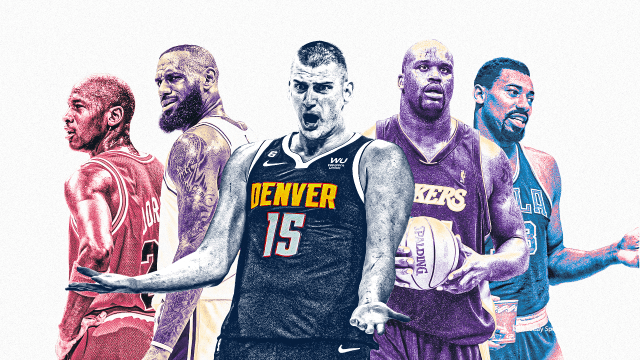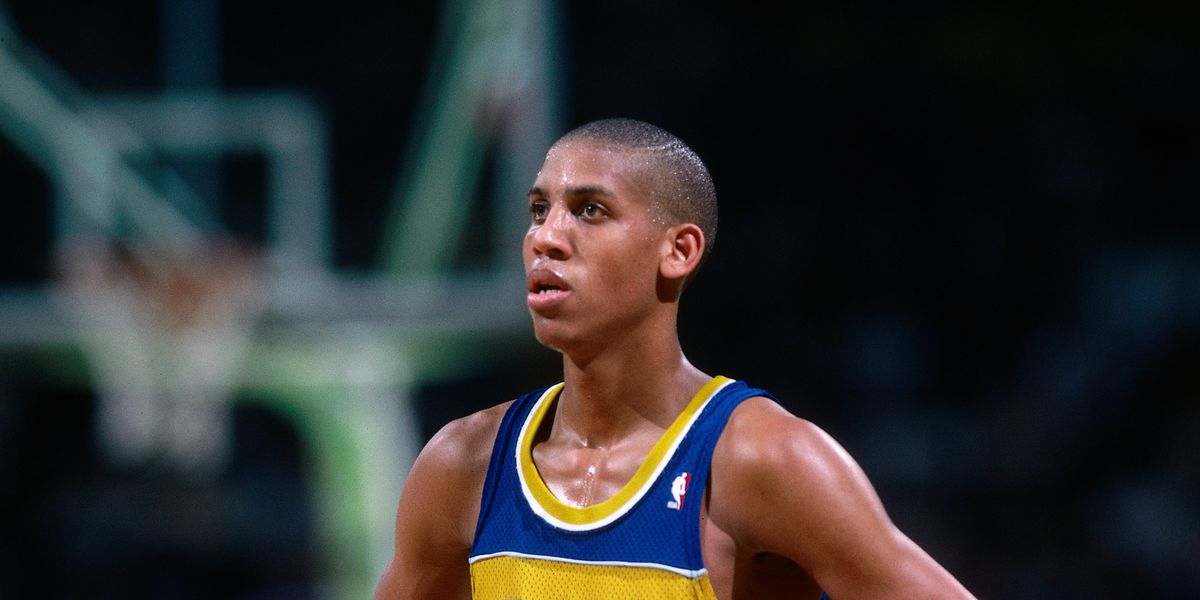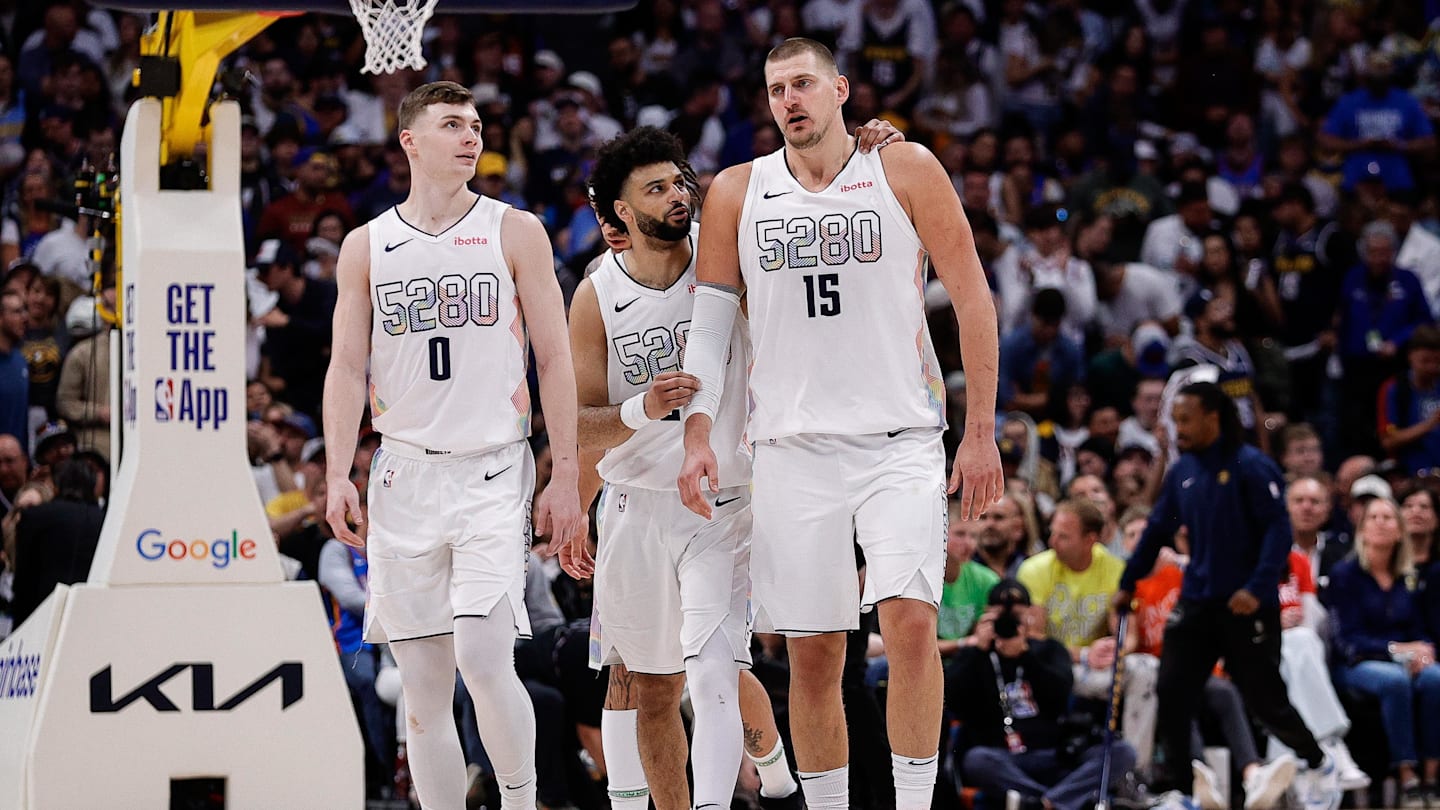In light of Denver Nuggets star big man Nikola Jokic finishing second in the MVP vote in 2024-25, despite averaging a 29-point triple-double while becoming the first non-guard in NBA history to achieve that feat, today, we have decided to take a look at the best non-MVP seasons in NBA history.
Jokic is obviously on this list, and more than once, but so are some other all-time greats that you’ll recognize. One such player even averaged 50 points for an entire season and still didn’t win MVP.
We’re starting to sense a trend here, something about record-setting big men failing to win MVP despite awe-inspiring numbers.
Regardless, below, check out the best non-MVP seasons in league history.
LeBron James (2005-06)

Photo by John Biever/Sports Illustrated via Getty Images
Who finished ahead of him: Steve Nash
The 2005-06 NBA MVP race was a relatively close one between Steve Nash and James, one that Nash won by 236 points. James ranked third in the league in scoring that season as a 21-year-old, putting up 31.4 points per game to go with 7.0 rebounds, 6.6 assists and 1.6 steals on 48.0 percent shooting, one of the best individual seasons from a non-MVP ever.
James also led the Cavaliers to a 50-32 record in the regular season, despite his second-leading scorer being Zydrunas Ilgauskas at 15.6 points per game.
But Nash, the reigning MVP that campaign and very popular among media members, got the benefit of the doubt from voters after a season in which he put up 18.8 points and a league-leading 10.5 assists per contest on 51.2 percent shooting, 43.9 percent shooting from three. Also helping Nash in the vote was the fact that the Phoenix Suns went 54-28 that season.
Michael Jordan (1996-97)

Anne Ryan-USA TODAY NETWORK
Who finished ahead of him: Karl Malone
Imagine leading the league in scoring at 29.6 points per game as the reigning league MVP, coming off a championship and leading your team to a 69-13 regular season. And still not earning league MVP honors.
That’s exactly what happened to Jordan in 1996-97, a season in which he was passed over for MVP in favor of Karl Malone. Now, that’s not to say Malone didn’t somewhat deserve MVP that year. After all, he averaged 27.4 points, 9.9 rebounds, 4.5 assists and 1.4 steals that season and led the Utah Jazz to a 64-18 record.
Jordan actually took the ’97 MVP snub well publicly, telling the media that he was happy to be in consideration for the award every year:
“Because of the opinions of others,” Jordan said. “They choose to give it t a guy who’s been in the league just as long as I have been, just as consistent, and been on a team that’s just as successful this year, I can’t gripe with that, and you know, I can’t have any jealousy or animosity towards Karl.” ‘Even though I may have a good season certainly from a stat standpoint, it wasn’t my best season, you know, but as long as I’m consistently thought of as an MVP, I’m happy with that.”
Either way, there’s no doubt Jordan used that snub as fuel in the ’97 then in the ’98 Finals when he faced Malone and the Utah Jazz.
Shaquille O’Neal (2000-01)

DON EMMERT/AFP via Getty Images
Who finished ahead of him: Allen Iverson, Tim Duncan
In 2000-01, Shaquille O’Neal averaged 28.7 points, 12.7 rebounds, 3.7 assists and 2.8 blocks on a league-leading 57.2 percent shooting mark.
And didn’t win MVP.
The reigning NBA champion Lakers that season sort of sleptwalked through the regular season, going just 56-26 that campaign, which would be an excellent year for most teams, but not really for the three-peat L.A. teams of the early 2000s. As such, O’Neal was snubbed for MVP honors in favor of Allen Iverson, who led the league in scoring that season at 31.3 points per game for a 56-win Philadelphia team, and in favor of Tim Duncan, who averaged 22.2 points, 12.2 rebounds, 3.0 assists and 2.3 blocks while appearing in all 82 games for a 58-win San Antonio squad.
Of course, O’Neal showed everyone who the best player was that postseason when he led the Lakers to a second-straight championship, sweeping Duncan in the Western Conference Finals and then defeating Iverson in the Finals four games to one all while eventually earning Finals MVP honors.
O’Neal was none too happy about not winning MVP, going off on the media about how the award was given away by March of that year. He even seemed to throw a bit of shade at Iverson, saying that if he shot 50 times per game, he’d average 100 points (considering how unstoppable prime Shaq was, he might not have been wrong, either):
His reign will end with the announcement that Allen Iverson or Chris Webber, or even Tim Duncan, is this year’s winner, by all appearances. In fact, there is an assumption throughout the league that Iverson has already won it, and indeed he might have, as the ballots were due this week. “You guys gave the award away in March,” O’Neal said Friday, “because somebody was doing good. There’s a lot of people doing good.” …. “If I take 50 shots a game, I’m going to average a hundred,” O’Neal said..
O’Neal also said if he didn’t win the award unanimously, he didn’t want it:
He blames the media, and he swears he doesn’t want “a sympathy man’s award.” “If I can’t win that award unanimously, or close to unanimous, I don’t want it,” he said. Asked why, he said, “Because I don’t know what you guys look for. If you look for percentages. If you look for consistencies. I have no idea what you look for, and it really doesn’t matter.”
The voters seemed to take him up on that, as O’Neal finished third in the vote.
Regardless, it’s pretty ridiculous that O’Neal, a four-time champion and three-time Finals MVP, finished with one regular-season MVP award in his career. Maybe similarly to a certain modern Nuggets star, O’Neal didn’t get as much MVP love as he deserved because it was so obvious he was the best player in the league that he got looked over when it came time to actually vote for MVP.
Kareem Abdul-Jabbar (1969-70)

Malcolm Emmons-USA TODAY Network.
Who finished ahead of him: Willis Reed, Jerry West
It’s extremely difficult for a rookie to win MVP. And yet, Abdul-Jabbar gave the field a run for its money in 1969-70, posting one of the best non-MVP statistical seasons ever. That season, Abdul-Jabbar put up 28.8 points, 14.5 rebounds and 4.1 assists per game on 51.8 percent shooting. He did so on a 56-26 Bucks team, no less.
Abdul-Jabbar had nine 40-plus point games that season, topped by a 51-point game on Feb. 21, 1970. This was in an era when NBA players used to decide MVP, so take that for what it’s worth. Maybe they just weren’t to anoint a rookie the best player in the league yet, although Abdul-Jabbar was knocking on that door off the bat. Then again, Wes Unseld did win MVP as a rookie just two seasons before that, and with much weaker numbers than Abdul-Jabbar’s, so why fellow players snubbed rookie-year Abdul-Jabbar for MVP remains a mystery.
Nikola Jokic (2022-23)

Brad Penner-USA TODAY Sports
Who finished ahead of him: Joel Embiid
After winning MVP back-to-back years, Nikola Jokic’s MVP case might have been afflicted with voter fatigue, with the award going to Joel Embiid despite Jokic averaging 24.5 points, 11.8 rebounds, 9.8 assists and 1.3 steals on an absurd 63.2 field-goal percentage mark. That’s despite Jokic launching 2.2 threes per game, meaning he was doing his scoring outside of the paint.
Regardless of who deserved MVP that year, either way, Jokic’s 2022-23 is by far one of the most impressive statistical campaigns to not win MVP in league history. Jokic’s play helped the Nuggets go 48-21 with him in 2022-23. On the other hand, Denver went 5-8 without Jokic that season.
Nikola Jokic (2024-25)

Ron Chenoy-Imagn Images
Who finished ahead of him: Shai Gilgeous-Alexander
If Jokic’s statistical season in 2022-23 was impressive, 2024-25 was on another level for the Serbian superstar. Jokic averaged 29.6 points, 12.7 rebounds and 10.2 assists per game – making him the third player ever to average a triple-double, and the first non-guard – while averaging 1.8 steals and shooting 57.6 percent from the floor, 41.7 percent from three.
Obviously, Jokic is the only player in league history to put up a 29/12/10 stat line, which makes the fact he didn’t MVP in 2024-25 all the more hard to believe, at least if you’re looking at just the statistical case.
Michael Jordan (1986-87)

USA TODAY Sports
Who finished ahead of him: Magic Johnson
Boasting the highest non-Wilt scoring mark in NBA history in ‘87, Jordan averaged 37.1 points per game in 1986-87, to go with 5.2 rebounds, 4.6 assists, 2.9 steals and 1.5 blocks on 48.2 percent shooting. He also shot 85.7 percent on a league-leading 11.9 free throws per contest.
We’re not here to argue the merits of Magic Johnson winning MVP over Jordan in ‘87, but there’s no doubt Jordan that season had one of the most absolutely absurd statistical seasons from a non-MVP ever. Had the Bulls not been such a mediocre 40-42 that season, Jordan might have actually been MVP.
His Airness was a bit more vocal about losing out on MVP in ’87, questioning what went into the voting when he felt his defensive impact, along with his offense, could have earned him the accolade:
“I think both of us had good years,” Jordan said. “Sometimes, you have to question what is the credentials for the MVP. I think other parts of my game was not acknowledged as well as it should’ve been. To have 100 blocks and over 100 steals also, I think you have to be contributing in other areas as well as scoring.”
Either way, it’s tough to go wrong when your two options are prime Jordan and prime Johnson. Jordan earned more than his fair share of MVP love later in his career anyway.
Kareem Abdul-Jabbar (1972-73)

Malcolm Emmons-USA TODAY Network
Who finished ahead of him: Dave Cowens
In the midst of winning three MVPs in four seasons, Abdul-Jabbar finished second in the vote in ‘73, losing out on the honor to Celtics legend Dave Cowens, who put up 20.5 points, 16.2 rebounds and 4.1 assists on a 68-win Celtics team. For comparison, Abdul-Jabbar averaged 30.2 points, 16.1 rebounds and 5.0 assists that season on 55.4 percent shooting.
Abdul-Jabbar actually earned 1st Team All-NBA honors that season while Cowens finished 2nd Team. That could be an indicator that if that season had taken place in an era when the media decided winner like today, Abdul-Jabbar might have won MVP.
LeBron James (2017-18)

Jaime Valdez-USA TODAY Sports
Who finished ahead of him: James Harden
In 2017-18, James finished second in the MVP vote to James Harden in a result that wasn’t all that close. Regardless of who deserved MVP that year, there’s no doubt James’ campaign was spectacular, putting up over 27 points, eight rebounds and nine assists per game on 54 percent shooting from the floor.
Considering James launched five threes per contest that season, that makes his immaculate shooting that year all the more impressive.
Regardless, with the Cavaliers having a bit of a mediocre season in 2017-18 and Harden being the best player on a 65-win Rockets team, James was snubbed of the honor.
For what it’s worth, if James had an MVP vote in 2017-18, he would have voted for himself:
“I would vote for me,” James told The Associated Press. “The body of work, how I’m doing it, what’s been happening with our team all year long, how we’ve got so many injuries and things of that nature, guys in and out, to be able to still keep this thing afloat, I definitely would vote me.”
The advanced numbers agreed with the pick in 2017-18, however, as although James cleared Harden in VORP, Harden had the edge in BPM and WS/48.
Michael Jordan (1988-89)

USA TODAY Sports
Who finished ahead of him: Magic Johnson
Before Jordan became a six-time NBA champion, he needed to earn the benefit of the doubt about whether or not his style of play was conducive to winning. Again, in hindsight, that’s hard to believe.
But it’s true, so even though he was coming off league MVP honors, Jordan missed out on the honor in 1988-89 despite leading the league in scoring at 32.5 points per game, to go with a career-high 8.0 nightly rebounds and assists, and 2.9 steals. Needless to say, those numbers made him one of the best MVP runner-ups in league history.
Michael Jordan (1989-90)

Stephen Dunn /Allsport
Who finished ahead of him: Magic Johnson, Charles Barkley
Voters who doubted Jordan’s ability to win still weren’t convinced the following season, 1989-90, a campaign in which Jordan didn’t even finish second in the vote, but third. That year, Jordan played in all 82 games, leading the league in scoring at 33.6 points per game, as well in steals at 2.8 per contest. Jordan shot 52.6 percent from the floor that campaign while leading the Bulls to a 55-27 record.
That was good enough to be the third most valuable player in the NBA that year, according to voters.
Wilt Chamberlain (1960-61)

Malcolm Emmons-USA TODAY Sports
Who finished ahead of him: Bill Russell, Bob Pettit, Elgin Baylor
Get ready to see Wilt Chamberlain’s name a lot here, because he dominates this next part of the ranking. And it’s only right, as Chamberlain had a slew of seasons in which he put up astronomical numbers and didn’t win MVP in large part due to the winner being decided by fellow players and not by media voters.
One of those seasons was in 1960-61, when Chamberlain put up 38.4 points per game to go with 27.2 rebounds – both marks led the league that year – while shooting nearly 51 percent from the floor.
Chamberlain’s 38.4 points per game were the third-highest scoring average in NBA history, and yet, Chamberlain finished not second or third in the MVP vote that season, but fourth. Go figure.
And that’s while Chamberlain finished with 1st Team All-NBA honors ahead of Russell. It seems that NBA media back then valued Chamberlain’s game more than fellow players did.
Chamberlain finished second in the MVP vote by the USWBA (United States Basketball Writers Association) in ’61, behind just Russell.
Wilt Chamberlain (1962-63)

Photo By Malcolm Emmons-USA TODAY Sports Copyright (c) 2004 Malcolm Emmons
Who finished ahead of him: Bill Russell, Elgin Baylor, Oscar Robertson, Bob Pettit, Jerry West, Red Kerr
Chamberlain had the second-highest scoring average in league history in ‘63, putting up an astronomical 44.8 points per game along with 24.3 rebounds. But by product of the San Francisco Warriors going 31-49 that season and missing the playoffs, Chamberlain didn’t win MVP. Chamberlain finished seventh in the vote in 1962-63 despite putting up nearly 45 points per game.
Russell did finish with 1st Team All-NBA honors over Chamberlain in ’63, for what it’s worth, so media and fellow players were on the same page in this instance. At the same time, that doesn’t explain Chamberlain finishing seventh in MVP voting that season behind Red Kerr.
Strange as it may be, even basketball media didn’t believe Chamberlain deserved MVP that year, as the USWBA had Chamberlain fifth in their MVP vote.
Wilt Chamberlain (1963-64)

Malcolm Emmons-USA TODAY Sports
Who finished ahead of him: Oscar Robertson
In ‘64, Chamberlain again led the league in scoring at 36.9 points per game and in rebounding at 22.3. Chamberlain’s 36.9 points per game that season is good for the sixth-highest scoring average in NBA history, as the all-time big man had nine games that campaign with at least 50 points, and three games where he scored 59.
The USBWA had Chamberlain as their MVP for ’64, for what it’s worth.
Wilt Chamberlain (1961-62)

Malcolm Emmons-USA TODAY Sports
Who finished ahead of him: Bill Russell
Truly the hardest to believe non-MVP seasons in NBA history, Chamberlain finished second in the vote in ‘62. That was the season he set the single-season scoring record at 50.4 points per game while chipping in 25.7 rebounds per game and shooting 50.6 percent from the floor. On top of that, Chamberlain’s Warriors went 49-31, so it’s not like the team performance excuse can be used on him.
What’s more, Chamberlain finished 1st Team All-NBA ahead of Russell in ’62, despite losing out on MVP to his rival big man. Perhaps averaging 50 points per game was seen as something commonplace in the NBA of the early ’60s, because the USBWA also voted Russell as their MVP over Chamberlain in ’62.
All in all, Chamberlain’s fellow players didn’t deem that worthy of MVP, but either way, we now deem it the best non-MVP campaign the NBA has ever seen.


